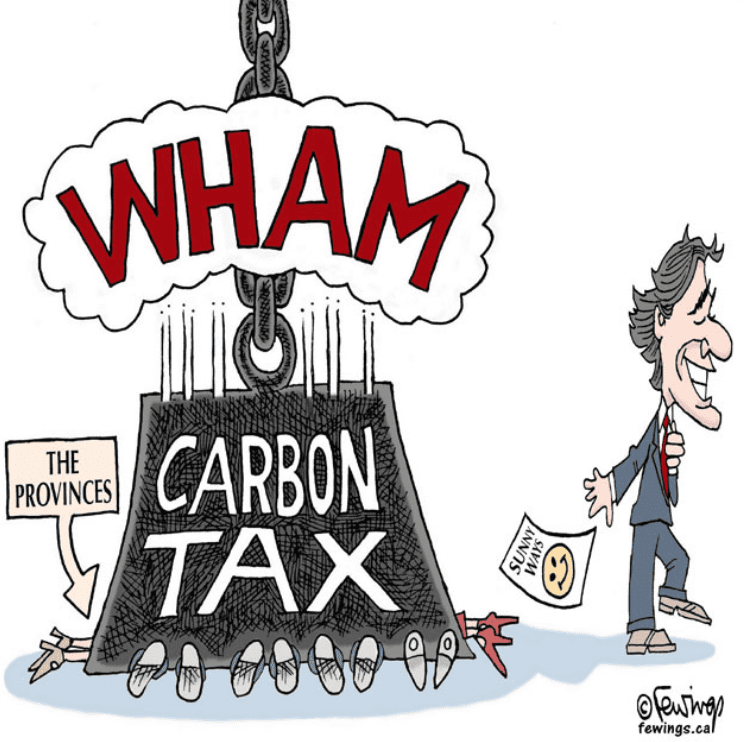Provincial governments should be required to record the exact and full cost of failed legal challenges as a line item in their budgets.
That might chill the acceleration of conducting intergovernmental relations in court.
The Saskatchewan Court of Appeal decision on the federal carbon tax makes a good example of how taxpayers and voters are ill served by these tactics.
The Saskatchewan government under Premier Scott Moe had challenged the federal government's right to impose the tax. Alberta's United Conservative Party (UCP) had intervened on the Saskatchewan government's side (before the UCP won the recent election).
The court decided by a three-to-two margin Ottawa has the constitutional right and jurisdiction to impose the tax.
But carbon pricing is such a big political divide in this country that premiers across the province are not leaving the issue alone. Saskatchewan will appeal the ruling and Jason Kenney's newly minted government will join in.
Ontario, Manitoba and New Brunswick have similar challenges in the courts.
Kenny campaigned in the spring on his vow to axe the existing Alberta NDP's provincial carbon levy, fight Ottawa in court over its version of the levy, and free the province from carbon tax in general.
But now, with the initial court decision upholding the federal tax, Alberta will be saddled with legal fees and Ottawa is likely to impose its tax on Alberta because the province plans to dump its home-grown carbon price. The federal tax is slightly higher than the NDP tax and rebates and projects funded through the tax won't be targeted specifically to Albertans.
It's a likely lose lose for Alberta taxpayers mounting legal expenses for an appeal and higher carbon tax with less direct benefit if that appeal fails.
Kenney also vows to launch similar court challenges against Bill C-69, the Trudeau 'pipeline killing bill' and Bill C-48, the tanker ban, if they pass.
He is promising to build a litigation fund to wage legal battles against opponents of the oil industry, including well-funded environmental groups.
On a province-to-province basis, B.C. is also resorting to the courts against Alberta over the enactment of Bill 12, which provides a mechanism for Alberta to turn off the oil taps to B.C.
In all of this judicial to-ing and fro-ing, the lawyers rejoice, court docket clerks work overtime trying to shoe-horn in all the activity and the taxpayer pays the price of all the litigation.
Is this really governing in the public interest? Is there no spirit of cooperation in the confederation?
Kenney himself has the answer to one of the alternatives to the revolving court challenge door. Trust the electorate.
The fall federal election will be "an opportunity for Canadians to say that they don't want busy-body politicians telling them how to live their lives and taking more money out of their pockets," he said on the day he was sworn in as premier.
Why not wait out the political cycle rather than work your novice justice minister to the bone?
There could also be some ramifications for a future Conservative federal government in these provincial challenges. An unintended consequence might be precedents set by the court decisions which would alter a future Ottawa government's jurisdiction over environmental and tax realms.
On the province-versus-province file, British Columbia Liberal Leader Andrew Wilkinson is suggesting a novel solution to the continuing ill will between neighbours. He has asked Kenney, B.C. Premier John Horgan and Prime Minister Justin Trudeau to sit down with Indigenous leaders and settle their differences on pipelines and tankers.
"As an indication of good faith, Alberta should commit to not 'turning off the taps' while negotiations are underway. Likewise, British Columbia should not undertake a court challenge to Bill 12 while the parties are engaged," wrote Wilkinson.
How about some meaningful negotiations? Bring in a nice lunch, keep the advisory staff to a minimum, and come up with some compromises.
Voters should have the right to expect their political leaders to have the skills to work out their solutions with skillful negotiation and discussion rather than pass the responsibility over to the judiciary.
Photo Credit: Ethan Allen Institute






